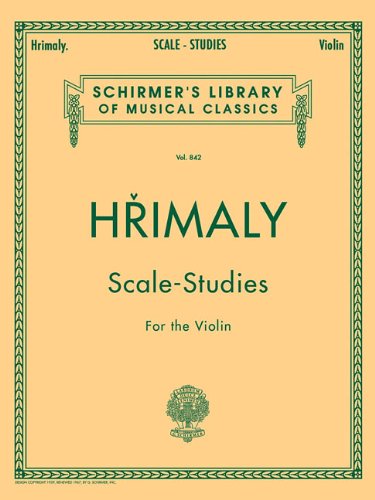 Reddit reviews Hrimaly - Scale Studies for Violin: Schirmer Library of Classics Volume 842 (Schirmer's Library of Musical Classics, Volume 842)
Reddit reviews Hrimaly - Scale Studies for Violin: Schirmer Library of Classics Volume 842 (Schirmer's Library of Musical Classics, Volume 842)
We found 4 Reddit comments about Hrimaly - Scale Studies for Violin: Schirmer Library of Classics Volume 842 (Schirmer's Library of Musical Classics, Volume 842). Here are the top ones, ranked by their Reddit score.

An excellent fundamental methods book.It is very good for warm up or daily practice.For unaccompanied violin studies, technique and scales.
Began playing the violin when I was 7. I took lessons until I went to college. Didn't play it that much in college, but I had it with me for a few semesters. After I graduated, I brought my violin with me and play it every so often.
The Suzuki books are garbage. If your teacher uses them, consider buying your own books or asking him/her to use other books. You could also consider getting a private teacher that doesn't use Suzuki.
On the topic of material, get a scales book (Hrimaly), a technical book, and later on get a book on double-stops. You won't need to use double-stops that often, but it helps with balancing the bow so you only hit the strings you want, and also with intonation.
I don't have all of my music with me so I can't recommend the other books that I have. However, I think every violinist needs to know how to play the Bach Double.
Whatever you do, don't give up on playing. It takes a long time to become even slightly decent at violin. It's the hardest instrument to learn to play, but everyone is always impressed when they hear someone play violin, because either they don't have the ear to notice the mistakes, or they notice but realize how hard it is.
When it comes to concerts and whatnot, if you have to play in front of people, keep what I just said in mind - most of them won't be able to hear your mistakes. Loosen up, correct your mistakes early but don't assume you won't make any mistakes. Realizing that you can fix mistakes before most people will notice takes a lot of the anxiety away.
Now I think I'm gonna have to go play my violin for a bit. :)
This is great for beginners!
I would say though, that anyone interested in really progressing invest in a scale studies book. I've been using Hrimaly since I was in High School, and theres seriously nothing better out there for kicking your own ass at scales. I go back and forth between loving this thing and absolutely despising it.
https://www.amazon.com/Hrimaly-Studies-Schirmers-Library-Classics/dp/0793525683
In addition to the Suzuki repertoire, I had these books when I first started:
String Builder, Intro to the Positions, and Practical Methods all have several books in the series, and I went through quite a few of them. If I recall correctly, they're filled with fairly simple etudes that aid in building fundamental techniques. I wonder if a teacher would recommend other progression books for adults, however?
You could also use that extra time to practice one octave scales for intonation, finger positioning, and bow variations (whole notes, quarter, eighths, then different slurs such as 2 notes in one bow, 4 notes, 6...). Not only do scales help in solidifying fundamentals, but just knowing how to play/identify different scales, as well as it's minor, harmonic, and melodic counterparts goes a long way when playing more complex music.
I don't know that there's an easy way to transition from guitar to violin. It doesn't seem like there are a whole lot of commonalities between the two. Also I think it's easy to assume that "learning violin" means you want to become the next Heifetz or Perlman. But maybe it's safer to ask what you want to do with the violin? Any style you're interested in?
If it's bluegrass or folk, you might have to deal with a lot of doublestops (sort of like "chords" on a violin) and fast runs. Because of the hand position and lack of frets, doublestops are going to be weird to play at first.
If it's jazz (yes violin jazz exists), you'd probably learn best by just listening to lots of violin jazz.
If it's indeed classical, you just need to get a teacher from day 1. There are a lot of minute details in violin playing that are ostensibly meaningless initially but later essential to great playing.
In the meantime, you may want to invest in a scales book. One of the more famous ones is by Hrimaly. Don't cheat with the book by playing all the notes on one string. By crossing the strings, you'll get a better grasp of note relationships (kind of like what you would do in guitar). If you want to venture into doublestops you can start learning with this book.
If you're not going to get a teacher, I guess just watch videos. But do pay attention to proper form. Sometimes form is meant to improve tone. Other times proper form is to prevent injury. No i'm not joking.